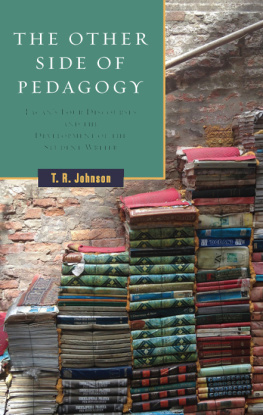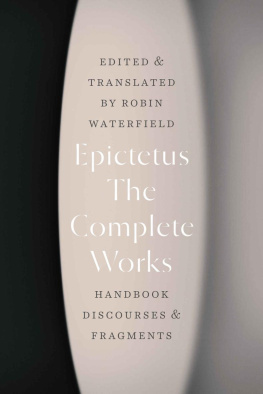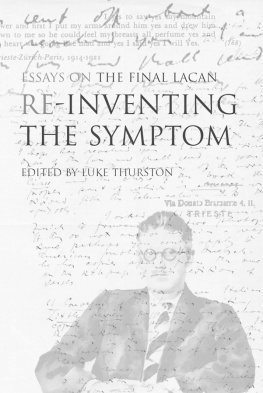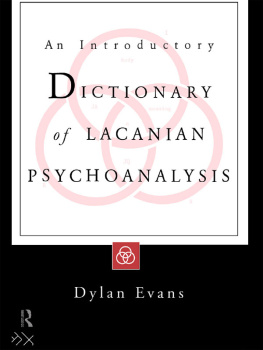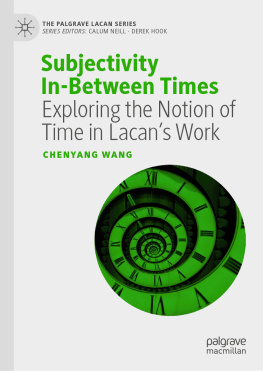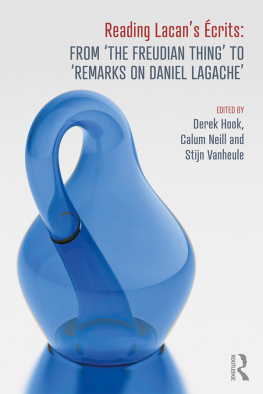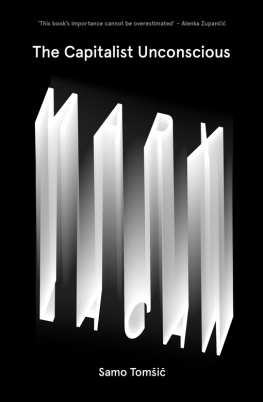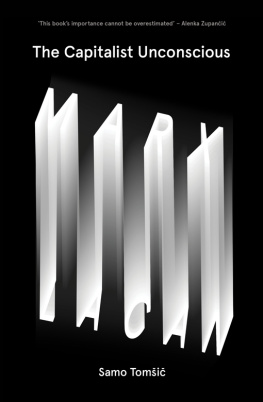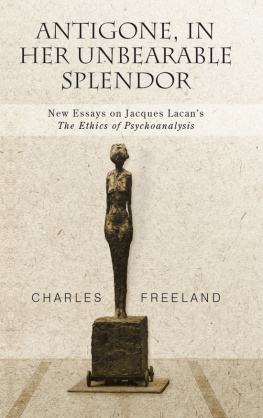THE OTHER SIDE OF PEDAGOGY
SUNY series, Transforming Subjects:
Psychoanalysis, Culture, and Studies in Education
Deborah P. Britzman, editor
THE OTHER SIDE OF PEDAGOGY
L ACANS F OUR D ISCOURSES AND THE D EVELOPMENT OF THE S TUDENT W RITER
T. R. JOHNSON
Cover image by T. R. Johnson
Published by State University of New York Press, Albany
2014 State University of New York
All rights reserved
Printed in the United States of America
No part of this book may be used or reproduced in any manner whatsoever without written permission. No part of this book may be stored in a retrieval system or transmitted in any form or by any means including electronic, electrostatic, magnetic tape, mechanical, photocopying, recording, or otherwise without the prior permission in writing of the publisher.
For information, contact State University of New York Press, Albany, NY
www.sunypress.edu
Production by Ryan Morris
Marketing by Anne M. Valentine
Library of Congress Cataloging-in-Publication Data
Johnson, T. R., 1964
The other side of pedagogy : Lacans four discourses and the development of the student writer / T. R. Johnson.
pages cm. (SUNY series, transforming subjects: psychoanalysis, culture, and studies in education)
Includes bibliographical references and index.
ISBN 978-1-4384-5319-4 (hardcover : alk. paper)
ISBN 978-1-4384-5321-7 (ebook)
1. English languageRhetoricStudy and teaching (Higher)Psychological aspects. 2. Psychoanalysis and education. 3. Lacan, Jacques, 19011981. I. Title.
PE1404.J647 2014
| 808'.0420711dc23 | 2013045656 |
10 9 8 7 6 5 4 3 2 1
For my parents,
Richard and Julia Johnson
C ONTENTS
A CKNOWLEDGMENTS
This book would never have reached its present form without the support of a great many people. First, I must thank Marguerite Nguyen for her unflagging encouragement and for keeping me company when the work was most heavy and intense. Also, a number of colleagues played an important part in the books initial inception: Mike Griffith of Tulane Universitys Innovative Learning Center helped me to create the video that was a primary inspiration for this book; Aleksandra Hajduckzek served as a summer research assistant and gathered the material through which the initial idea for this book was born; Vince Ilustre and Agnieszka Nance of Tulanes Center for Public Service provided me with numerous opportunities to think publicly about these issues and encouraged me constantly in this journey, as did Susan Danielson at the University of New Orleanss Learning Resource Center. I owe a special debt of gratitude to Dawn Skorczewski, who was instrumental in helping me to find a publisher. I also offer sincerest thanks to Heidi Hoechst, whose reading of the books introduction enabled me to make a great leap forward in clarifying my argument. And, at SUNY Press, I must thank Beth Bouloukos and Deborah Britzman for their openness to this project and prompt responses every step of the way. Additionally, Id like to thank Rafael Chaiken, Anne Valentine, Dave Prout, and Ryan Morris for their work in preparing this manuscript for the public. I also would like to thank two of my colleagues in the English Department at TulaneGaurav Desai and Joel Dinersteinwhose support has been essential throughout my years here. I must also thank the late Jim Slevin of Georgetown University for first awakening in me a passion for theories and practices of writing pedagogy, and also Tom Byers at the University of Louisville, without whom these passions could not have become a professional calling. Im especially grateful as well to the Freshman Writing Programs postdoctoral teaching fellows who have served at Tulane since Hurricane Katrina, for they have provided me with many hours of stimulating conversation and opportunities for reflection: Alison Graham Bertolini, Michelle Beissell-Heath, Molly Burke, Sean Connolly, Sean Desilets, Victoria Elmwood, Vikki Forsyth, Roz Foy, Ora Gelley, Rick Godden, Jonathan Goldman, Cat Gubernatis, Megan Holt, David Kaufman, Todd Kennedy, Alice Kracke, Jacob Leland, Ryan McBride, Emad Mirmotahari, Patience Moll, Isa Murdock-Hinrichs, Angela Naimou, Cory Nelson, Tom OConnor, Shannon Payne, Alex Ruch, Srdjan Smajic, Travis Tanner, Emily Wicktor, Kellie Warren, and Anne-Marie Womack. I owe a special debt of gratitude to those postdocs who have served as my assistant director of the Freshman Writing Program: Patricia Burns, Lauren Cardon, Joe Letter, Judi Livingston, Dan Mangiavellano, and Ashlie Sponenberg. Finally, of course, I must extend my deepest thanks to my family and to my many friends in Louisville and New Orleans, elsewhere and on the other side.
A grant to support the publication of this book was awarded by Dean Carole Haber and the Executive Committee of Tulane Universitys School of Liberal Arts.
An article-length version of the main argument of this book appeared in JAC 31:34, 2011.
INTRODUCTION
R ECOVERING THE U NCONSCIOUS
P EDAGOGYS O THER S IDE
I dont often talk with my colleagues in the English Department about teaching. Weve been trained to identify primarily as scholars, and the institution rewards us most directly for our publications. Though we all spend many hours per week on our courses and our students, and though our teaching is the one thing we all have in common, words about our teaching occur in our talk together almost not at all. Why?
Perhaps pedagogy is the scholars unconscious, or, more pointedly, perhaps pedagogy is so suffused with the unconscious that we figure it, in our conversations with each other, as a version of the unconscious: we struggle to repress it, and it spills out anyway, every which way, all the time, as we perform our knowledge and authority for each other but redouble our efforts to distance ourselves from the reality of the classroom. Of course, over the last few decades, those of us with a special interest in pedagogy have produced enough books and articles that our fieldcomposition studieshas gained a degree of legitimacy among the fields housed in English departments, and practices initially advocated by teachers of writingnotions of writing as a process of drafting and revising, and the proper place therein of copyediting, say, or small-group collaboration or technologyhave become common in nearly every English professors thoughts about student writing. But the vast majority of us direct our greater intellectual energy and sophistication elsewhere.
When I talk with those colleagues who are not on the tenure track and whose sole charge is to teach students to write, I inevitably find myself talking about rhetoric. Specifically, I talk to them aboutand this is the official language that I devised for the first-year writing program that Ive run for a decadethe need to initiate students into academic and public discourse through lessons in research, analysis, and argument; and the need to give students lots of opportunities to practice with various invention strategies, stylistic principles, and delivery technologies, so that they can begin to produce increasingly complex, increasingly coherent texts, for increasingly diverse and distant audiences. But even though I have distinct ideas about what all of this means and how it can fit together, Im always a little unsatisfied with my formulation, because I dont think any of us really knows much about how student writers develop during the college years. Most pointedly, what we lack is a language for how college students develop or fail to developas writers, and, for that matter, as intellectuals, as citizens, and as selvesand for defining the role that we, as their teachers, can play in that development when we engage the writing that we ask them to do.

